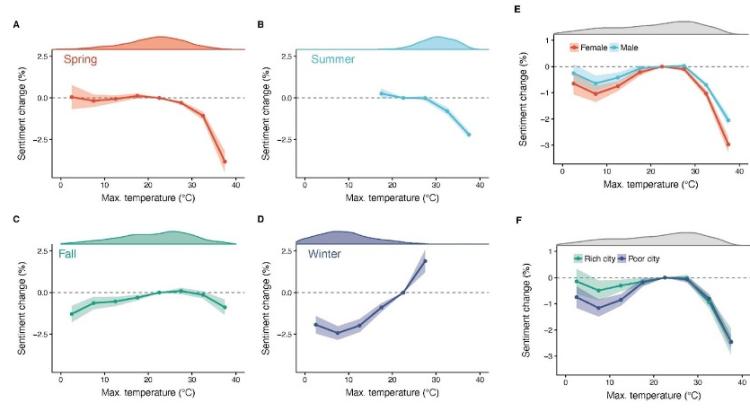Extreme Temperatures and Emotional Well-Being

The Heterogeneous Effects of Temperature on Sentiment. Image Credit: Jianghao Wang
This week the U.N. Intergovernmental Panel on Climate Change (IPCC) reported the world will surpass the 1.5ºC warming threshold by 2030; the report makes it clear that the time to act on climate is now. With that threshold exceeded, extreme weather is expected to become the norm. What impact will this have on human emotional well-being? What does data reveal about real-time effects of extreme temperature events on our daily lives? Recent studies link climate to psychological well-being and higher temperatures can worsen people’s outlook on life. What we need to understand, in a global context, is how to use this information to plan mitigation and adaptation strategies and improve global health outcomes in face of climate crises.
Investigating the connection between climate events and emotion
In One Earth, researchers from the MIT/CRE investigate how a better understanding of the relationship between chronic climate events and emotional well-being could accelerate climate action. The paper utilizes over 400 million geotagged posts across 43 million users from the social media Weibo (the Chinese equivalent to a Twitter-like platform) in China, coupled with the real-time meteorological conditions people face when posting, to estimate how climatic factors influence people’s expressed sentiment.
“With 18.6% of the world’s population, China is the largest country by population. Therefore, the impacts of climate change there have important global implications,” writes Jianghao Wang, the lead author of the paper. China is important to study for another aspect, “China is huge and contains very different climate regions,” says co-author Siqi Zheng. Furthermore, even in a single climate region, adaptation techniques can vary, “they have both good adaptation techniques and poor adaptation techniques, due to income inequality, this makes for a good comparison of how [or not] adaptation techniques are affecting happiness during extreme weather.” said Zheng, who lived in Beijing before moving to Cambridge MA, she experienced comfortable winters due to the government’s centralized and subsidized heating, however summers were, “gruelingly hot, as many households do not have central cooling.”
Understanding how the impacts of climate change affect individual subjective well-being in the future is crucial for designing adaptation strategies. The Co-author, Nick Obradovich, says the study examines how exposure to extreme temperature, “[can] modulate individuals’ online expressions, and to the extent that such expressions reveal underlying emotional states.” These measures taken along with future studies could help uncover, “emotional precursors to the more serious impacts of heat exposure upon mental health,” says Obradovich. Despite its importance, little is known about the day-to-day impacts of weather on individual subjective well-being in developing nations.
Zheng is CRE’s faculty director and the STL Champion Professor of Urban and Real Estate Sustainability, her specialty is urban and environmental economics, with a focus on fast-urbanizing countries and regions, including sustainable urbanization, sustainable real estate, place-based policies, and self-sustaining urban growth. Wang is an associate professor at the Institute of Geographic Sciences & Natural Resources Research in the Chinese Academy of Sciences. His research covers geospatial big data mining, spatial statistics, and urban and regional studies. Obradovich is Chief Scientist for Project Regeneration; his research combines his affinity for data science and computational methods to understand the effects of climate change and technological advancement on human behavior.
Future outlook
In the study, the authors find that “extreme weather worsens emotional expressions on social media,” and temperature is among the weather conditions causing negative sentiment. The authors then look into the future to see how differing climate models coupled with their data would impact expressed sentiment over time, finding that “Climate change is likely to worsen daily sentiment by 0.3%–2.1% over the course of this century in China.” Combining these results with climate projections and comparing similar data in the US shows climate change has a very real potential for net-harmful impacts on human well-being around the world.
The lessons from this study are launching new research within the MIT/CRE’s Climate and Real Estate Multi-Pi Research Cluster. This research intends to focus the real estate industry on its imperative to act.
Read the full paper: “A 43-Million-Person Investigation into Weather and Expressed Sentiment in a Changing Climate”


